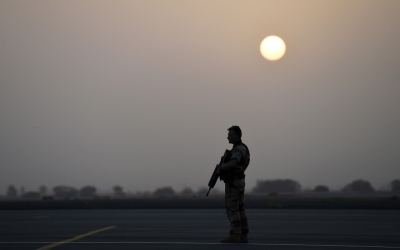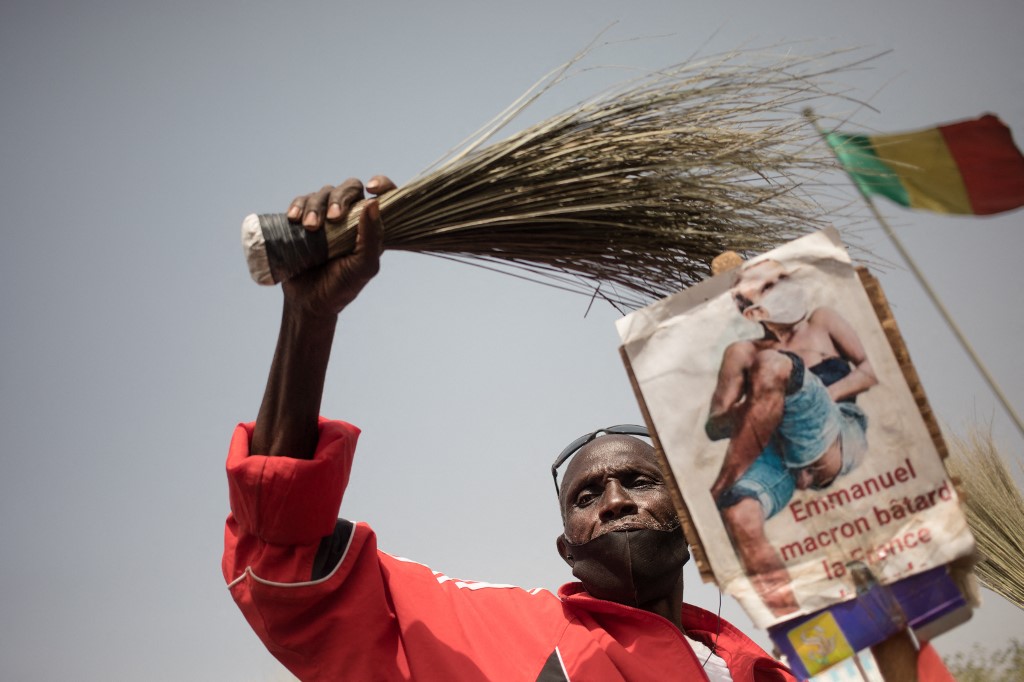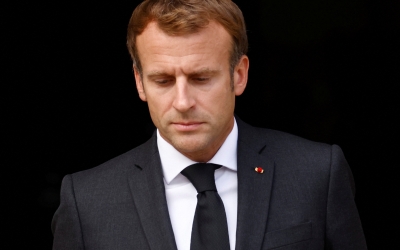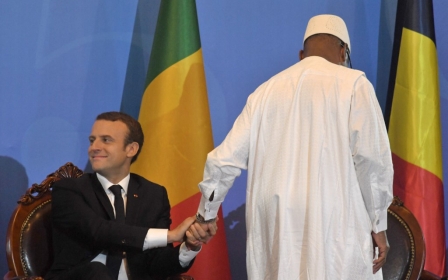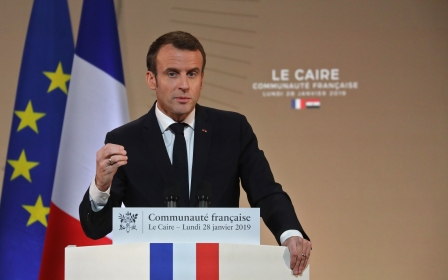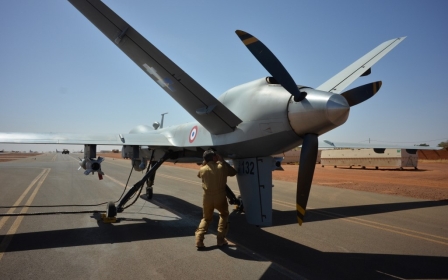After pulling out of Mali, France must rethink its relationship with Africa
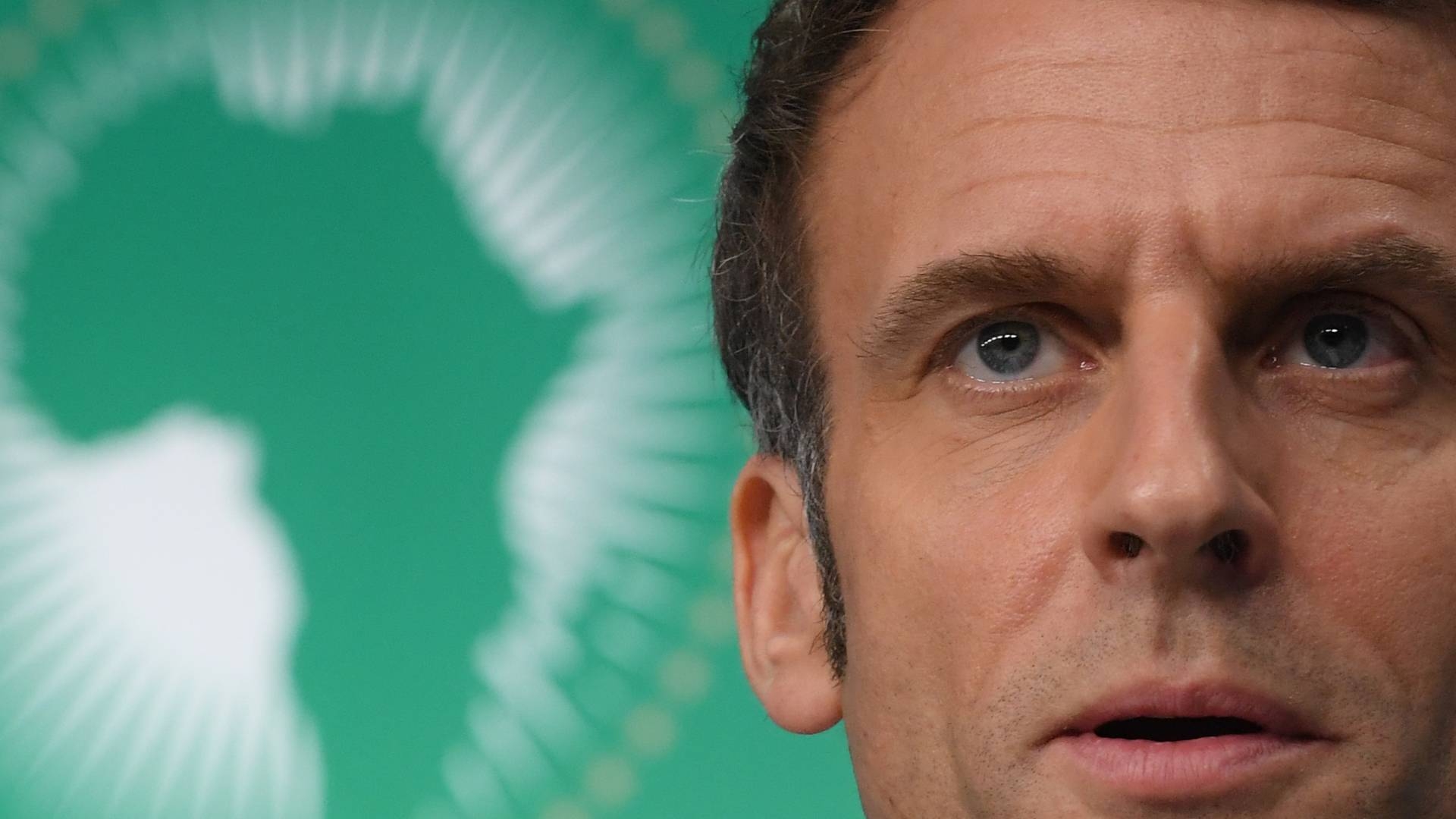
When he took office on 14 May 2017, French President Emmanuel Macron was clear that the last thing he wanted was "to get trapped in Mali". When he announced last week the withdrawal of French troops from that country and France’s intention to refocus its anti-terrorist campaign in the Sahel eastward to Niger and south to the Gulf of Guinea, there was no disguising the painful truth. The trap has closed on the French president.
Long forgotten is the rapturous welcome afforded by the Malian population to France’s then-President Francois Hollande when, on 2 February 2013, he arrived in the Saharan town of Timbuktu after French forces had liberated it from rebel forces. Malians had overwhelmingly welcomed France’s military operation, codename Serval, which had involved 3,700 troops and liberated Gao, Timbuktu and Kidal from the rule of militant groups.
France’s pull-out from Mali has been dreaded in Paris, not only for its geopolitical implications, but also for its powerful symbolism
Nine years later, the military rulers of Mali have called in the Russian Wagner mercenary group and the mood in this landlocked and poor African country is one of bitterness and anxiety. Anti-French feelings have increased across the region. There is bitterness too in Paris, and especially in the French army, which has lost 53 officers and soldiers until the last week of January, and has been properly booted out of a former colony where it had been present for over a century.
France has to foot a bill of €8bn and finds it hard to understand why its European partners, with the exception of the European Union's foreign affairs chief, Josep Borrell, have been lukewarm in their support. Having pleaded with many of its EU partners to send troops to Mali, France left them gasping when last summer it announced its planned withdrawal from Mali
France’s pullout from Mali has been dreaded in Paris, not only for its geopolitical implications, but also for its powerful symbolism: a humiliating withdrawal of French soldiers from a part of the world where its influence long stood unchallenged but is quickly being eroded by newcomers that include China, Russia, Turkey and Germany.
New MEE newsletter: Jerusalem Dispatch
Sign up to get the latest insights and analysis on Israel-Palestine, alongside Turkey Unpacked and other MEE newsletters
'Globalisation of Africa'
French leaders failed to understand that the world of the 21st century had witnessed, in the words of Antoine Glaser, “a globalisation of Africa”. The long-standing influence of former colonial powers such as France and Britain was being challenged by newcomers, two of which are working in lockstep: China pushes its economic interests and ramps up investment, while Russia sells weapons and plays a spoiling game as it takes advantage of infighting between European countries or, in this case, French missteps.
France’s hasty retreat will also be hailed by militant groups as a major victory. But it is worth noting that in a vast region of five million square kilometres, it is not easy to know who is a militant, a smuggler, a drug-runner (the Sahel has become a transit zone for drugs from Latin America and people fleeing war zones and drought in other African countries) or simply an aggrieved farmer or cattle herder.
One has to go back to the initial reason for the French intervention of 2013 to appreciate the law of unintended consequences. When the Nato-backed but French, British and US-led operation unfurled in Libya throughout the spring and summer of 2011, Gaddafi armouries and the very modern weapons they stocked were pillaged, not least by some of his troops who were Touaregs from northern Mali. These people were the victims of the repression of southern-based Malian leaders. This bitter conflict has endured since Mali acquired independence from France in 1960.
The collapse of Libya encouraged the rush of Touareg and assorted militant groups to the Malian capital Bamako in January 2013, which forced the leaders of Mali to call the French army to the rescue. Whether Bamako was about to fall to “hordes of Islamists”, as the coalition of former Gaddafi soldiers and militant groups was then described, is hotly disputed today among specialists.
The trope of systematically presenting the violence which has spread across the Sahel and neighbouring countries as jihadi-inspired does nothing to explain the long-standing and complex roots of violence in the Sahel. What is not in doubt is that terrorism and violence are now threatening countries closer to the coast, such as Cameroon and Ivory Coast.
Glaser notes that the French army is retreating to the coast, from where it had conquered the African hinterland in the late 19th century. He does not rule out the emergence of loosely built "Islamic emirates" across certain regions of this vast land, as existed in pre-colonial days.
French strategic interests
Preventing the spread of terrorism to France and the rest of Europe has, all along, been put forward by France as a key reason for policing the Sahel. But French journalist Jean-Dominique Merchet says that every senior French counterterrorism official he has spoken to since 2011 has dismissed such a risk.
Unlike terrorist groups such as the Islamic State (IS) group and al-Qaeda, which had every intention of striking European and American targets - and successfully did - African militant groups, even when affiliated with better-known brands, were totally uninterested in such a policy. This probably explains why France’s EU partners have often been sceptical about the country’s self-appointed role of "gendarme de l’Afrique".
How was France ever to succeed in 'eradicating terrorism' with 5,000 men? Fighting yesterday’s war usually guarantees defeat
The French army, with the exception of some officers, and their political masters' thinking and approach towards the region seem to be stuck in the post-colonial days of the Cold War, when France could shuffle dictators as suited its broader economic and strategic interests. French journalist Pierre Haski noted in a radio show on 17 February that western armies have long since lost the ability to win asymmetric wars.
How was France ever to succeed in “eradicating terrorism” with 5,000 men? The best estimate is that there are about 4,000 militants scattered across the Sahel, using four-wheel drives, motorbikes and small weapons. Fighting yesterday’s war usually guarantees defeat.
The violence spawned by the continued turmoil in Libya has also affected other North African countries, not least Algeria and Tunisia. In 2013, as Serval was unfolding, a terrorist attack from Libya closed down the Algerian gas field of Tiguentourine and resulted in the deaths of 39 foreign workers and an Algerian security guard, the worst such attack against a gas field ever recorded. Two terrorist attacks in 2015, at a hotel and a museum, killed 60 people, mostly foreign holidaymakers, and destroyed Tunisian tourism, a key source of foreign income and jobs: they were planned by Tunisian jihadis in Libya.
Paternalistic, neocolonial attitude
The strained relations between Algeria and France have also hampered the French, as Algerian military leaders, according to my sources, are unhappy at the idea of the French army - or for that matter any non-African army - being deployed in its backyard along its long frontiers with Mali and Niger. Because of its serious domestic problems, Algeria has not played any significant role in Libya since 2011, but the often offhand behaviour of Paris towards Algiers has not helped.
Africa to the Africans might sound like a hollow slogan, but Macron’s attitude towards Africans and their leaders has appeared to many of them as paternalistic, and at times neocolonial. The French president never mentions the violence inflicted by colonial rule. This period has come back to haunt France. Nothing illustrates this better than the bitter debate about immigration and the presence of millions of people of African and North African descent in France.
The presidential campaign is dominated by right-wing candidates, two of whom (Marie Le Pen and Eric Zemmour) are adepts of the “the great replacement” theory articulated by novelist Renaud Camus earlier this century, which argues that people of African and North African stock are going to overtake people of European stock to become the majority in the near future. Macron does not share such views but, with the collapse of the left-wing vote, they dominate a debate that polarises the country.
No turning back
France will not be able to recast its relations with Africa if it does not accept that its style of military interventions belongs to a past - glorious or not depending on your point of view. It will have to stop lecturing African leaders on democracy. Macron criticises the Mali junta because it does not respect democracy, but neither did the Malian president in 2013.
In 2021, France was happy to anoint Mahamat Deby, the son of Idriss Deby, the ruthless dictator of Chad for 21 years, as the new strong man of the country. France and the EU make respect for democracy a litmus test of their cooperation with African countries, but more and more Africans and North Africans no longer buy this spin.
France’s hasty retreat from Mali coincided with an EU-Africa summit in Brussels last week. Never has the need to rethink the broader policy of France and the EU in Africa been greater.
The continent has been globalised and there is no turning back, but European political elites have yet to appreciate that their approach is 20 years out of date. Shedding the trappings of its colonial past is all the more difficult for France because the country’s claim to be a major power rests, to quite some extent, on its military heist in Africa.
Two centuries ago, the writer and politician Alexis de Tocqueville justified his country’s conquest of Algeria, whose methods of colonisation he condemned in harsh words, by the need France had to “project its glory in Africa”. The post-Napoleon settlement in Europe did not allow the French army to intervene in Europe. What was once known as “la Françafrique”, the neocolonial web of collusive economic and political ties which bound France and its former colonies and more broadly two centuries of history, is drawing to a close.
The views expressed in this article belong to the author and do not necessarily reflect the editorial policy of Middle East Eye.
Middle East Eye delivers independent and unrivalled coverage and analysis of the Middle East, North Africa and beyond. To learn more about republishing this content and the associated fees, please fill out this form. More about MEE can be found here.



